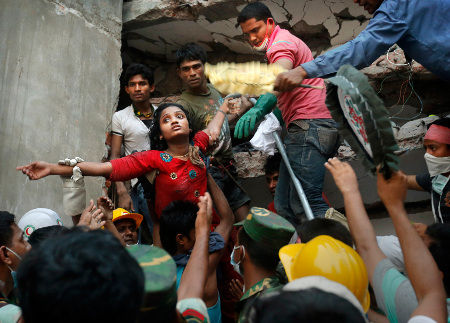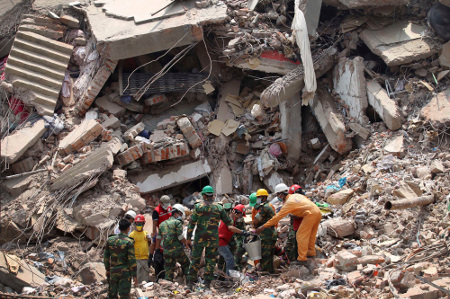Everyone's Talkin' About Inequality—Let's Talk About the System Causing It
Lesson from Bangladesh
January 6, 2014 | Revolution Newspaper | revcom.us
On April 24, 2013, the Rana Plaza factory in Bangladesh collapsed and became an instant tomb for more than 1,100 people. Aside from the dead, many others are now maimed for life, their bodies mangled, without arms and legs. The incident became emblematic of a world of inequalities. But what people aren't talking about is why capitalism must generate such inequalities.

April 30, 2013, Bangladesh: Factory worker being pulled from the rubble where more than 1,100 workers died. Photo: AP
Since this disaster, the deadliest in the history of the garment industry, questions have been raised: Who should be responsible to the victims' families? What can be done to prevent this from happening again? What is the culpability of companies like Walmart that outsource to factories in Third World countries?
Many have pointed to the unfair, unsafe, sweatshop conditions of the workers in Rana Plaza: that Bangladesh has one of the lowest costs of labor in the world with the national minimum wage at 21 cents an hour, or $38 per month; that the eight-story building was so shoddily built that workers had reported massive cracks in the walls the day before and refused to work—but factory owners coldly calculated that deadlines were more important than safety so workers were told if they didn't return to work their pay would be cut.
Millions around the world looked at this horrific incident and what it says about the gross inequalities in the world. Many people are not just aware of, but appalled by the fact that we live in a world where so many people live in conditions of misery, poverty, and starvation. Some talk about how capitalism is "greedy" and "unfair" for the majority of people who live on this globe.

April 30, 2013, Bangladesh: An attempt to rescue several factory workers buried in rubble after the Rana Plaza clothing factory collapsed. Photo: AP
But what is really needed—to get at the problem AND the solution—is a lot more discussion and understanding about WHY capitalism, by its very nature, HAS TO generate such inequality and impoverishment. WHY the economic laws that govern the system of capitalism will and can only lead to horrors like what happened in Rana Plaza. That no amount of regulation, reform, compensation, or even capitalists with good intentions who try to treat the workers fairly, is going to fundamentally change this hellish situation. That what is really needed is REVOLUTION to get rid of this system of capitalism, and to replace it with a whole new economic and political system working towards the emancipation of humanity worldwide.
The story of Rana Plaza provides a lesson in exactly this point.
A System at Work
Mango is an international fashion brand based in Spain that ships 60 million garments a year. At the time of the disaster, it had arranged to have 25,000 samples of polo shirts and other items produced at the Phantom Tac factory in Rana Plaza. This factory, a recent New York Times article noted, "could be regarded as an unlikely attempt to prove that a Bangladeshi factory could be socially responsible and make a profit." But let's look at what these efforts to be a "socially responsible" factory really show.
One of the owners of the Phantom Tac factory, David Mayor in Spain, did seem to be trying to do some good things. His fashion clothes, for example, had the motto "clothing with a heart." Mayor said he wanted to show it was possible to run an ethical business in which workers were trained well and treated with respect. He teamed up with a Vatican missionary to offer a training program aimed at poor women in rural Bangladesh who flock to Dhaka, the Bangladesh capital, in search of work. He hired about a dozen of them at his own factory. He wanted consumers to understand how their clothes are made, so he created a website to connect them with workers sewing their clothes. He opened a shop in Dhaka where clothes had a code on the sales tag so that buyers could type this in and learn about the Bangladeshi women who had made the garments they had bought. (See "Clothing Brands Sidestep Blame for Safety Lapses," New York Times, December 30, 2013.)
All this, of course, took money to set up. It took money to finance the rural training program. It took money to set up the shop in Dhaka. A woman was hired to develop the website. So what happens when someone like Mayor tries to "do something good" like this in the whole setup of capitalism?
Well, first of all, Mayor was not operating in a vacuum. He had to go up against all kinds of other capitalists all over the world who are trying to make a profit just like him. Other capitalists who are not spending this extra money on "socially conscious" projects.
Think of all the different companies around the world making clothes. There's a lot of anarchy here—uncertainty, disorder, and chaos.
By the time Mr. Mayor had set up his factory in Rana Plaza, he had already bought machinery, the cotton for the shirts, and bought people's labor to work and was paying them wages for that. He had already invested all that, and that money was gone—it was now embodied in the machinery, the raw materials, and the wages. So the only way he could get that back—plus end up with more capital in the form of more money, or profit—was to exploit the people working for his company—to have them produce more value than all the money he had invested in the first place. Then he had to sell the products, the shirts, in order to realize his profit.
BUT here's where the anarchy of capitalist commodity production and exchange comes in. Every capitalist is competing with all the other capitalists doing the same thing all over the world, facing the same compulsion to "expand or die," to beat out your competitors—or go under. And this requires cutting costs at every step along the way.
The fact of the matter is: The capitalists who aren't doing extra socially conscious projects like training programs for young girls in rural Bangladesh or connecting consumers in the West with factory workers in the Third World—which cost money—are going to have a competitive edge over someone like Mayor. So eventually Mayor will have to either stop such programs or go under.
In a 2008 interview in the World Trade Review, Mayor said he'd figured out that he would have to charge an extra 10 cents per piece to really improve the lives of his workers. And he said, "When you are a manufacturer negotiating orders with buyers that 10 cents becomes very important, it is very competitive and 10 cents becomes a lot."
In fact, Mango set up production in Bangladesh at Rana Plaza in order to cut costs to be more competitive. The New York Times noted: "Technology and investment are transforming the upper end of the industry, enabling Mango and other brands to increase sales, manage global inventories with pinpoint precision and introduce new clothes faster than ever—all as consumers now expect to see new things every time they visit a store. But these brands depend on factories in developing countries like Bangladesh, where wages are very low and the pressure to work faster and cheaper has spawned familiar problems: unsafe buildings, substandard work conditions, and repeated wage and labor violations."
While Mayor was trying to carry out some socially conscious projects, workers at the Phantom Tac factory said deadline pressures were relentless. Managers hid excessive overtime or other wage violations. There were violations of child labor. Conditions in the factory deteriorated as the company began to focus on winning larger orders. Right before the building collapse, under pressure to meet orders, workers were forced to work through the night. Workers were told if they complained they'd lose their job. (Reuters, "Bangladesh disaster crushes owner's ideal of clothes with a conscience," June 16, 2013)
Mayor's factory was just a small part of Mango's worldwide operations where a big part of its "growth strategy" has been placing a premium on efficiency, cost and speed. No room here for any extra "socially responsible" costs.
Eventually Mayor had to tighten expenses at his factory in Rana Plaza. He stopped funding the training program for women in the rural areas. The person developing the consumer website left.
Now, 200 of the men and women who worked in Mayor's factory—bent over their machines for 12 or more hours a day for barely enough to live on—are dead and others are now living with bodies crushed beyond repair.
Mayor has disappeared and his business partner in Bangladesh is in jail in connection with the building collapse.
*****
The 4,500 garment factories in Bangladesh and the 3.6 million garment workers in Bangladesh who are mostly women are part of a $1 trillion global clothing industry. Garment manufacturing in Bangladesh is a $20 billion industry. It is the mainstay of the country's economy, employing 40 percent of the country's industrial workforce. Bangladesh is the second-largest exporter of garments in the world (after China)—garments account for 80 percent of the country's exports. The bulk of these exports, 60 percent, go to Europe; 23 percent go to the United States—more than to any other individual nation.
In the business of making clothes, just like any other business, a capitalist has to get a bigger and bigger share of the market. Each one has to keep fighting to outdo their competitors or go under—and have to continually cheapen costs in order to stay alive. This means seeking out the lowest, most exploitative wages. This means cutting costs wherever possible—even if it means shoddy and dangerous working conditions. This means denying workers any kind of organizing rights. This means violating safety codes that if followed would require spending money.
The needless deaths of the workers in Rana Plaza teach us a lesson about the problem AND the solution.
There is no such thing as capitalism without inequality, without exploitation, without misery, without horrific disasters like what happened in Rana Plaza. This hellish situation is dictated by the very nature and laws of how this system must and can only operate. And yes, no amount of regulation, reform, compensation, or capitalists with good intentions who try to treat the workers fairly, is going to fundamentally change this hellish situation. What is really needed IS revolution to get rid of this system of capitalism, and to replace it with a whole new economic and political system working towards the emancipation of humanity worldwide.
If you like this article, subscribe, donate to and sustain Revolution newspaper.
